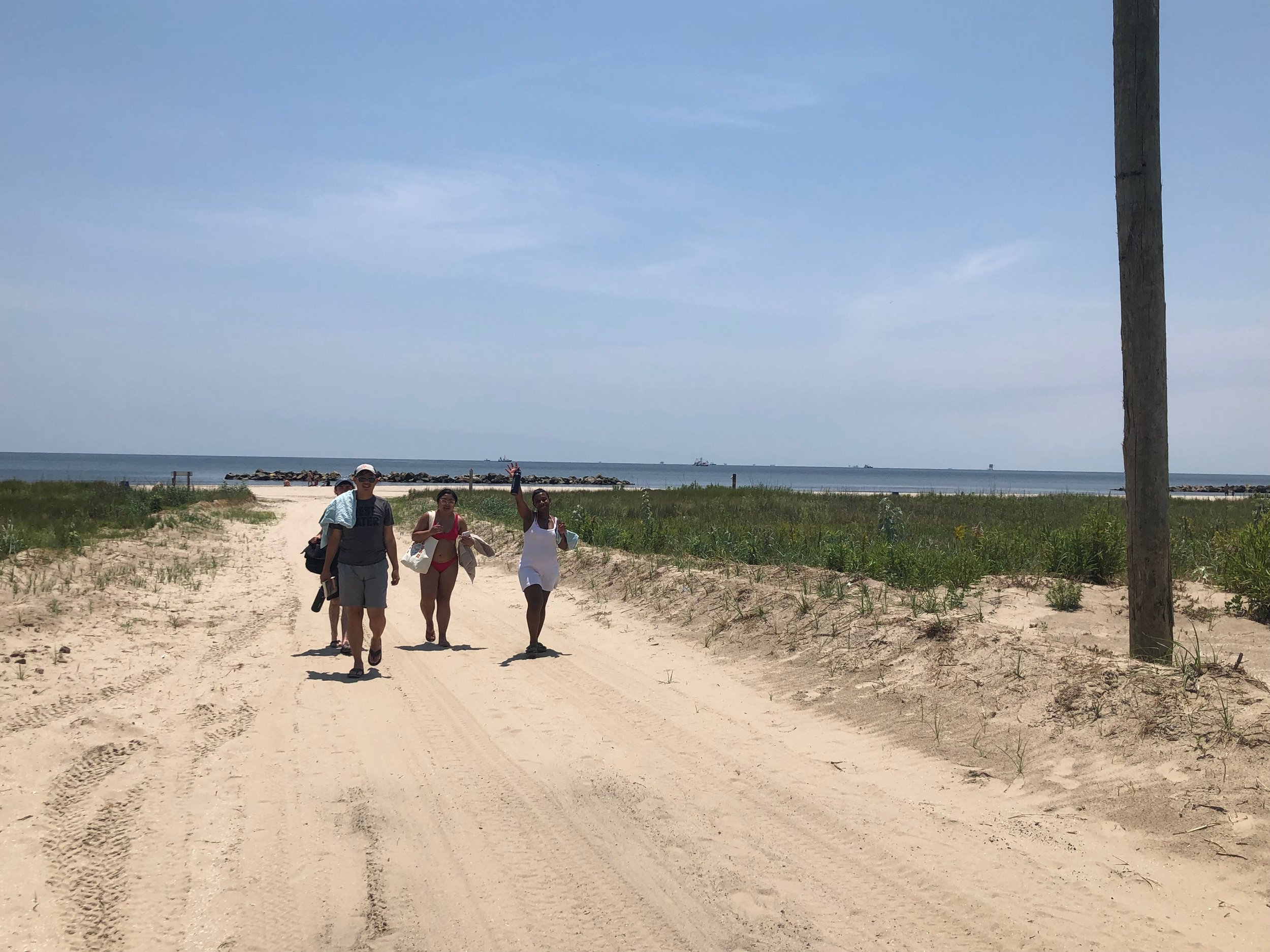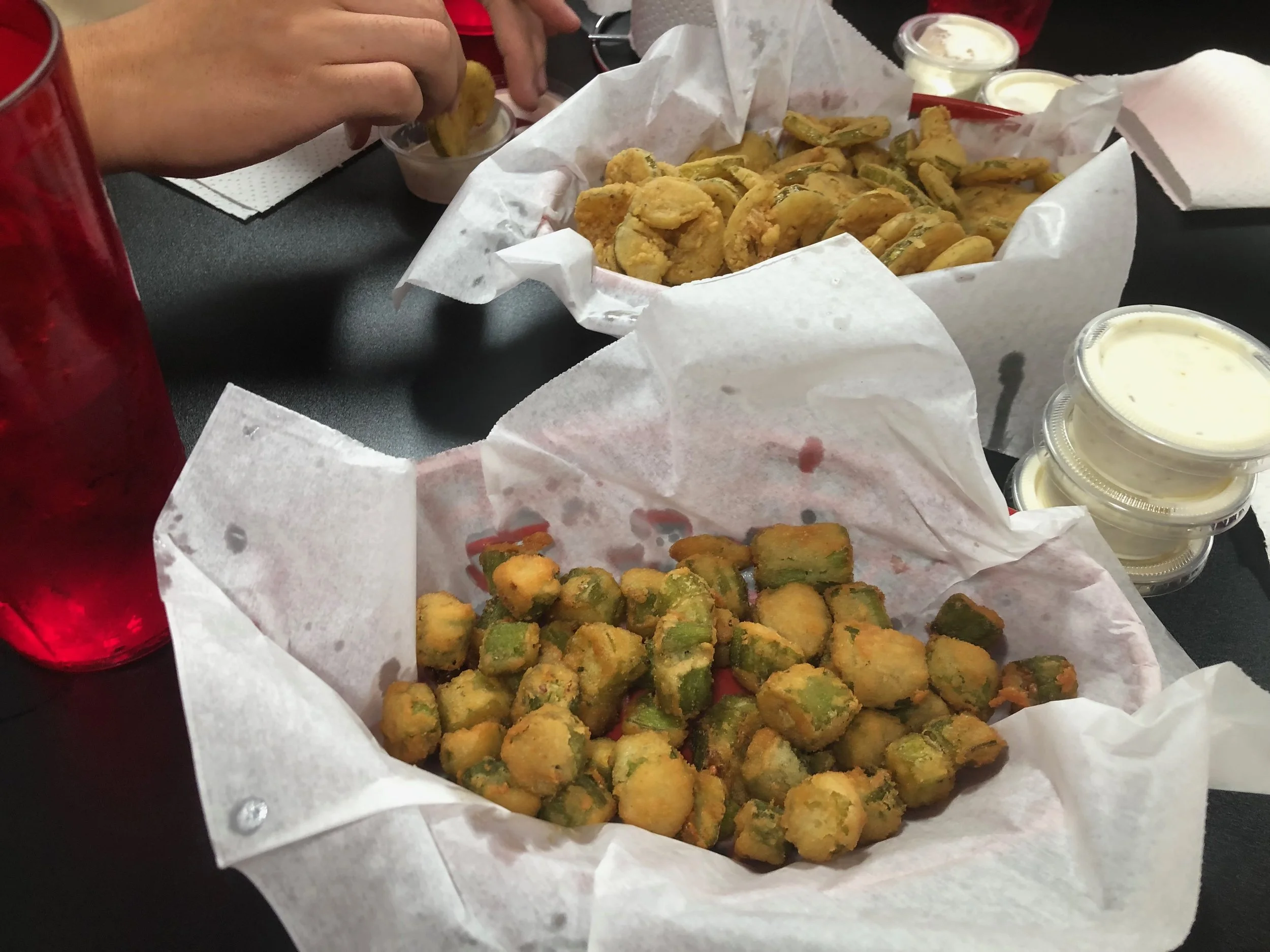As I type, I try to recall all the memories and connections that I made in the Southern state of Louisiana. All the locations we visited, the food and drink we devoured (especially this), and the lessons we learned when weren’t expecting them. In Grand Isle, I was taught the importance of rest and relaxation through the eyes of Kate Chopin’s The Awakening. Creoles like Edna do not let world events dictate their state of mind. Rather, they let themselves and nature take the steering wheel. This island was a great introduction into exploring my own Creole roots as well as grasping what it meant to live outside city lights. As a group, we shared our interests and aspirations over troves of fried (and non-fried) dishes, ranging from okra and fish po’boys at Starfish to jambalaya and meat pies at Jo-Bob’s Gas & Grill. The house-like cabin we stayed in played an immense role in easing conversation. A communal space was what we needed to break the ice and set the foundation for the relations that we nurtured throughout the rest of the Maymester.
“One good meal reminds us of why we want to be alive.”
If you want to satisfy your stomach, eat alone. If you want to take your taste buds farther, I recommend bringing a group to the table. The Big Easy absolutely adores this concept of food-sharing. In Anne Rice’s Interview with the Vampire, Louis, Lestat, and Claudia become almost inseparable during their nights of terror and hunger. From this novel, I was taught to never roam this city’s streets alone and to travel in a group, even if that group decides to split off and you find yourself in that fateful IHOP. Reflecting on these first encounters with the city, I was brought back to a phrase that I encountered while reading in Grand Isle: “si tu savais” (if only you knew). Despite the expertise and rigorous planning of our professor, it would be the moments where things did not go as planned that made the moments memorable, and that first night was no exception.
While in NOLA, I was also given a deeper perspective into life’s meaning via the words of Walker Percy’s The Moviegoer. Sitting in the Audubon Park, our group came to terms with how life is not about strictly following a deep purpose or meeting deadlines and obligations. For me, it is about using time in our own way, to enjoy the things that we like, meet new people, and to grow out of our past perceptions brought on by society’s everlasting weight. And there is no better place to accomplish all these feats than to be amongst the crowd of a Second Line parade on a Sunday afternoon. Watching the Jazz Fest documentary, I got a deeper dive into the cultural background of the people who lived and breathed New Orleans air. Before the film, I never knew about the city’s Cuban influence…although I was getting slight hints each time I saw a Cuban sandwich listed on the menu. Listening to the artists and observing the endless food vendor booths, I would love to check out the festival if I ever get the chance. What’s that phrase again? “Laissez les bons temps rouler” (let the good times roll). I don’t care how many times I hear it; it still holds significance. After this bookpacking venture, I will still find ways to incorporate this style of living into my daily rituals. If you ever decide to venture into this city – alone or with a few companions – just remember: for every dark alley and vice-ridden daiquiri stop, there is a wholesome Thai lady waiting to greet you with a Mai Tai, crispy tofu and okra, and a story.
Downtown Baton Rouge was where I felt I grew the most. In a quiet, almost ghost-like city, I learned about the impact that politics and race have on a community. Political figures like Huey P. Long sought to rally the local populations in the hopes of improving common folks’ lives. Speaking on race, Ernest J. Gaines’s A Lesson Before Dying was both one of my favorite and challenging books to read. In one of my previous blogs, I talked on the importance of community and bringing its inhabitants together in order to alter the racially charged norms of Southern society. During the course of the blog, I made a grave mistake, one that speaks on the issues that plague our American society when talking about race. Using the word “colored” in describing the people of Bayonne, the town that Grant found himself trapped in; it was at this moment I let down my group and completely disregarded the lessons in our seminars. With this terminology, I was dehumanizing the very community that I wanted to bring out of the pages and acknowledge. My conscience as a writer did not match with the words that I typed. One side of me feels that I made this decision to fit with the demands of literary accuracy and historical context. The other side, however, finds the mistake to be part of a learning gap which ties back into society’s inability to fully communicate the idea of racial equality. In all my academic years, never once was I taught the difference in capitalizing the word “black.” After one of our group discussions, I immediately went on my laptop and found an article on this topic from the New York Times. The article illustrated how Black is utilized to represent a shared culture and history, a shared identity; this concept is similar to the capitalization of Asian, Hispanic, and Native American. Today, we have a voice to change societal norms, whereas the Black community in Gaines’s book did not have this luxury, and it pains me to say that I was completely disregarding this important difference; After this Maymester, I will be taking this crucial moment of reflection and proactively – as well as consciously – reforming my writing to reflect my new mindset, to channel Gaines’s vision of a modern society where color is not the deciding factor for one’s way of living and dying.
As we journeyed through these novels, our group profited both physically and spiritually. These past few weeks have been filled with lessons, laughs, and over-cramped stomachs. What I will be lugging back with me are not just the souvenir shirts and extra calories, but the memories with my group mates, my comrades in arms (knives, forks, and all). I want to give a shout-out to Key who lent her voice when no one else dared. I want to also thank our incredible professor and logistics coordinator Andrew not just for the insightful material and local connections that he has relentlessly gathered, but also the personal stories that he was willing to share with us. As I savor these last bites of Louisiana, I think about how I was able to physically plant my feet in the very soil that my family migrated from so many years ago. My final takeaway that I want to share can be applied to all stages in life: keep learning and be open to new things and people; through these transactions that we willingly partake in, one may unexpectedly find happiness.
Trojans chilling near a fountain!
25 days of Louisiana’s best.




























































